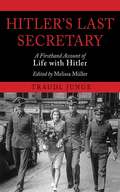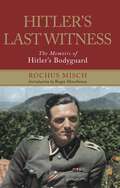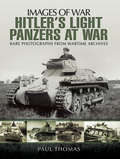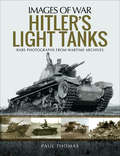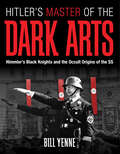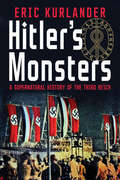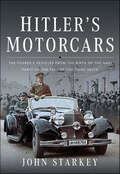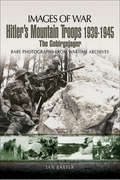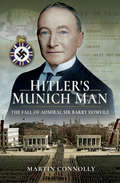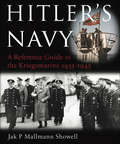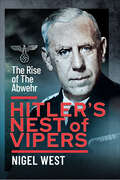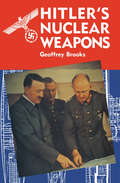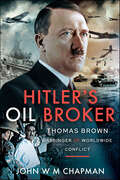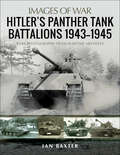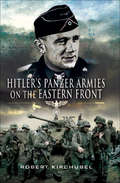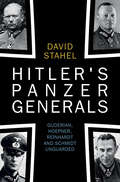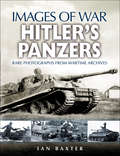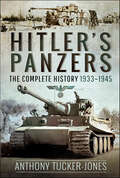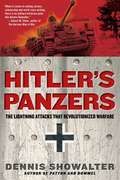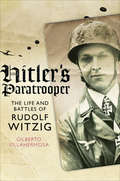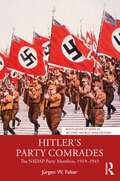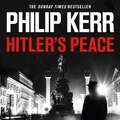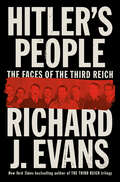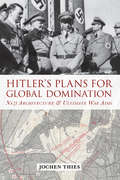- Table View
- List View
Hitler's Last Secretary: A Firsthand Account of Life with Hitler
by Melissa Muller Traudl JungeIn 1942 Germany, Traudl Junge was a young woman with dreams of becoming a ballerina when she was offered the chance of a lifetime. At the age of twenty-two she became private secretary to Adolf Hitler and served him for two and a half years, right up to the bitter end. Junge observed the intimate workings of Hitler’s administration, she typed correspondence and speeches, including Hitler’s public and private last will and testament; she ate her meals and spent evenings with him; and she was close enough to hear the bomb that was intended to assassinate Hitler in the Wolf’s Lair, close enough to smell the bitter almond odor of Eva Braun’s cyanide pill. In her intimate, detailed memoir, Junge invites readers to experience day-to-day life with the most horrible dictator of the twentieth century.
Hitler's Last Witness: The Memoirs of Hitler's Bodyguard
by Rochus MischThis memoir of Hitler&’s personal bodyguard presents &“convincing first-person testimony of the dictator&’s final desperate months, days and hours&” (Huffington Post). After being seriously wounded in the 1939 Polish campaign, Rochus Misch was invited to join Hitler&’s SS-bodyguard. There he served until the war&’s end as Hitler&’s bodyguard, courier, orderly, and, finally, as Chief of Communications. On the Berghoff terrace, he watched Eva Braun organize parties, observed Heinrich Himmler and Albert Speer, and monitored telephone conversations from Berlin to the East Prussian Headquarters on July 20, 1944—after the attempt on Hitler&’s life. As the Allied forces closed in, Misch was drawn into the Führerbunker with the last of the faithful. He remained in charge of the bunker switchboard as his duty required, even after Hitler committed suicide. Misch knew Hitler the private man. His memoirs offer an intimate view of life in close attendance to Hitler and of the endless hours deep inside the bunker. They also provide new insights into military events—such as Hitler&’s initial feeling that the 6th Army should pull out of Stalingrad. Shortly before he died, Misch wrote a new introduction for this English-language edition.
Hitler's Light Panzers at War: Rare Photographs From Wartime Archives (Images of War)
by Paul ThomasHitler's Light Panzers at War is a highly illustrated record of the German light tank from its beginnings in the 1930s to the key battles it fought in Poland, France, North Africa, Russia and North Western Europe. The book analyses the development of the light Panzer, which ranged from the Panzer I, II and the Czech build Panzer 35 & 38t. It describes how the Germans carefully utilized the development of these light machines for war, and depicts how these tanks were adapted and up-gunned to face the ever-increasing enemy threat.Using 250 rare and unpublished photographs together with detailed captions and accompanying text, Hitler's Light Panzers At War provides a unique insight into the many variants that saw action on the battlefield. It provides a vivid account of light Panzer operational deployment from the early Blitzkrieg campaigns to the final demise of the Nazi war machine.
Hitler's Light Tanks (Images of War)
by Paul ThomasThis fully illustrated WWII history examines the varieties of German light tanks and their usage throughout the conflict with rare wartime photographs. At the outbreak of the Second World War, Hitler&’s Wehrmacht led the way in armored warfare as blitzkriegs overwhelmed Poland and North West Europe. The contribution of light tanks such as Panzers I, II and 35(t) was critical. As the war spread to the Balkans, north Africa and the invasion of Russia, German engineers modified existing light tanks and developed new models. These included tank destroyers such as the Marder III Panzerjäger, SdKfz 138/1 and 139. There were anti-aircraft variants, including the Flakpanzer 38(t), and reconnaissance tanks such as the SdKfz 140/1 and the Aufklarungerspanzer 38(t). This superbly illustrated book gives a comprehensive overview of the multitude of German light tanks that came into service. With the text and captions providing technical data, the images show this formidable array of fighting vehicles in action across the theatres of war.
Hitler's Light Tanks (Images of War)
by Paul ThomasThis fully illustrated WWII history examines the varieties of German light tanks and their usage throughout the conflict with rare wartime photographs. At the outbreak of the Second World War, Hitler&’s Wehrmacht led the way in armored warfare as blitzkriegs overwhelmed Poland and North West Europe. The contribution of light tanks such as Panzers I, II and 35(t) was critical. As the war spread to the Balkans, north Africa and the invasion of Russia, German engineers modified existing light tanks and developed new models. These included tank destroyers such as the Marder III Panzerjäger, SdKfz 138/1 and 139. There were anti-aircraft variants, including the Flakpanzer 38(t), and reconnaissance tanks such as the SdKfz 140/1 and the Aufklarungerspanzer 38(t). This superbly illustrated book gives a comprehensive overview of the multitude of German light tanks that came into service. With the text and captions providing technical data, the images show this formidable array of fighting vehicles in action across the theatres of war.
Hitler's Master of the Dark Arts: Himmler's Black Knights and the Occult Origins of the SS
by Bill YenneA history of Nazi Germany’s SS and its leader examining the groups mystical cult aspects and Himmler’s rise through the ranks of power.Hitler’s Nazi Party, at its evil roots, embraced a bizarre interpretation of ancient European paganism, blending it with fragments of other traditions from sources as diverse as tenth-century Saxon warlords, nineteenth-century spiritualism, and early-twentieth-century fringe archeology. Even the swastika, the hated symbol of Nazism, had its roots in ancient symbolism, its first recorded appearance carved into a mammoth tusk twelve thousand years before Hitler came to power.At the heart of the evil was Hitler’s “witch doctor,” Heinrich Himmler, and his stranger-than-fiction cult, the deadly SS. The mundanely named Schutzstaffel, literally “protective squadron,” was the very essence of Nazism, and their threatening double lightning bolt was one of the most dreaded symbols of the Third Reich. With good reason: what the SS was truly protecting was the ideology of Aryan superiority.Hitler’s Master of the Dark Arts is the first history of the SS and its leader to focus on the mystical cult aspects of the organization. It follows Himmler’s transformation of the SS from a few hundred members in 1929 to over fifty thousand black-uniformed Aryans by the mid-1930s. Concurrent with its expansion and its eventual independence from the brown shirts of the SA, Himmler infused the Black Knights with a mishmash of occult beliefs and lunatic-fringe theories that would have been completely laughable—except that they were also used to justify the Final Solution.
Hitler's Monsters: A Supernatural History of the Third Reich
by Eric Kurlander&“A dense and scholarly book about . . . the relationship between the Nazi party and the occult . . . reveals stranger-than-fiction truths on every page.&”—Daily Telegraph The Nazi fascination with the occult is legendary, yet today it is often dismissed as Himmler&’s personal obsession or wildly overstated for its novelty. Preposterous though it was, however, supernatural thinking was inextricable from the Nazi project. The regime enlisted astrology and the paranormal, paganism, Indo-Aryan mythology, witchcraft, miracle weapons, and the lost kingdom of Atlantis in reimagining German politics and society and recasting German science and religion. In this eye-opening history, Eric Kurlander reveals how the Third Reich&’s relationship to the supernatural was far from straightforward. Even as popular occultism and superstition were intermittently rooted out, suppressed, and outlawed, the Nazis drew upon a wide variety of occult practices and esoteric sciences to gain power, shape propaganda and policy, and pursue their dreams of racial utopia and empire. &“[Kurlander] shows how swiftly irrational ideas can take hold, even in an age before social media.&”—The Washington Post &“Deeply researched, convincingly authenticated, this extraordinary study of the magical and supernatural at the highest levels of Nazi Germany will astonish.&”—The Spectator &“A trustworthy [book] on an extraordinary subject.&”—The Times &“A fascinating look at a little-understood aspect of fascism.&”—Kirkus Reviews &“Kurlander provides a careful, clear-headed, and exhaustive examination of a subject so lurid that it has probably scared away some of the serious research it merits.&”—National Review
Hitler's Motorcars: The Führer's Vehicles From the Birth of the Nazi Party to the Fall of the Third Reich
by John StarkeyAs well as providing photographs of Hitler’s cars and the men who became his chauffeur, John Starkey lists the technical specifications of those cars, and describes many of the journeys undertaken by the German leader over the course of two dramatic decades. Many are the photographs of Hitler standing proudly in the passenger seat of a midnight blue Mercedes, arm outstretched in his famous salute to the adoring German crowds. Hitler loved cars and loved to be seen in and next to the special automobiles he purchased or was presented with through friends and Nazi Party funds. His first car was a 1920 green Selve 8/30, purchased in 1922, which was soon disposed of in favor of a Daimler-built Mercedes 15/70/100 – and from that moment on every car in which Hitler was chauffeured around the Third Reich and occupied countries would be a Mercedes. Indeed, even while in Landsberg prison following his failed putsch in 1923, he was writing to a Mercedes-Benz car salesman in Munich about his next car, concerning the merits of the Benz 11/40 versus the larger 16/50. It was a grey 11/40 in which Hitler was driven away from Landsberg on his release in 1924. It was in his next car – a super-charged Mercedes-Benz 15/70/100 – that Hitler was involved in an accident with a large truck in March 1930. The truck was completely wrecked while the large Mercedes suffered only minor damage. This prompted Hitler to remark: ‘It was then I decided to use only a Mercedes for the rest of my life.’ From 1930 onwards, Hitler was driven around in a Mercedes-Benz 770, also known as the Grosser Mercedes. Only 205 of these huge, luxury cars were manufactured with many of those being used by top-ranking Nazis. Such was Hitler’s interest in cars, he arranged state sponsorship for Mercedes and Porsche (Auto Union) to participate in Grand Prix racing (today’s F1). So strong was the resulting financial support that German teams swept all before them between 1935 and 1939. Security was always a great concern of Hitler and his entourage and his 770 was protected with bullet-proof windows and steel armor-plate built into all metal work. Wartime brought increased security fears, resulting in another Mercedes entering the German leader’s car collection. This was the heavily armored, six-wheel G4, the first off-road Mercedes, in which Hitler could safely parade through the streets of conquered lands. As well as providing photographs of Hitler’s cars and the men who became his chauffeur, John Starkey lists the technical specifications of those cars, and describes many of the journeys undertaken by the German leader over the course of two dramatic decades.
Hitler's Mountain Troops, 1939–1945: The Gebirgsjager (Images of War)
by Ian BaxterA pictorial history of the Nazi special forces group, their training, and the action they saw during World War II. Hitler&’s mountain troops or Gebirgsjager were a group of elite soldiers ready for battle, whatever the conditions. These mountain men were trained to ski, climb and endure long marches, survive appalling conditions and were given a role as crack shock troops. Yet many of the campaigns in which the Gebirgsjager fought were on level ground where they had little opportunity to demonstrate their unique skills. Instead, they were invariably employed as assault infantry in conventional battle, a role in which every individual trooper excelled, but not one for which they had been trained. They fought in virtually all theaters of World War II, notably on the Eastern Front, where operations took them into the Caucasus. The Gebirgsjager were proud to wear the Edelweiss, the famous badge that set them apart and distinguished them as Hitler&’s mountain men. This superb book shows the Gebirgsjager in training and action from Poland, Norway, and France, through Yugoslavia, the Eastern Front, and in the closing stages of the War.
Hitler's Munich Man: The Fall of Admiral Sir Barry Domvile
by Martin ConnollyA &“fascinating&” account of the British director of Naval Intelligence who was interned during the Second World War as a Nazi sympathizer (The Armourer). Between the First and Second World Wars, there was a growth of fascism in Britain and anxiety about revolution was in the air. Concerns of a possible Fascist attempt to overthrow the established order were high, not to mention the rise of Hitler and the threat of invasion. With secret clubs and clandestine meetings now a threat, the security services decided to infiltrate their ranks. Sir Barry Domvile had served with honor during the First World War and had risen to director of Naval Intelligence. He became involved with Oswald Mosley and other far right leaders, also visiting prominent Nazis in Germany with whom he became enamored and formed &“The Link,&” a far right, pro-German organization. Concerns were raised and in 1940 he, along with his wife and son, were detained and imprisoned without trial under Regulation 18B of the Defence (General) Regulations 1939, under suspicion of being involved in a secret plot to bring in a Fascist Government. Hitler&’s Munich Man gives a detailed account of Domvile&’s background, detention, and hearings that were held behind closed doors and reveals the extent of his Fascism, pro-German attitudes and anti-Semitism. The first book to throw a spotlight on the saga, it examines his writings, both open and issued under a pseudonym, and considers the legitimacy of his detention. With photographs from the German archives, substantial coverage using the Secret Service files, Domvile&’s personal diaries, and other sources, the book will illuminate and inform the reader.
Hitler's Navy: A Reference Guide to the Kreigsmarine 1935–1945
by Jak P. ShowellThe German Navy, both before the War and throughout the years of fighting, was heavily outnumbered by the navies of Great Britain and the United States; nonetheless, it proved to be serious thorn in the sides of its adversaries. The U-boat war in the North Atlantic threatened the very liberation of Europe, while the major warships posed a constant threat to the Allied shipping lanes. This important reference book is an indispensable guide to the ships, organisation, command and rank structure, and leaders of the Kriegsmarine, and helps explain why it was such a potent force. A detailed text, augmented by photos, maps and diagrams, studies the German Navy from the Treaty of Versailles to the collapse of the U-boat offensive and the demise of the Third Reich. After covering the background organisation and naval bases, the author gives detailed descriptions of all the classes of ship from the battleships to motor torpedo boats and minesweepers. The officers and sailors are covered along with their uniforms and awards and insignia. Biographies of notable personalities and a chronology of the main naval events are included, as well as appendices and a select bibliography.Based on the author's 1979 title The German Navy in World War Two, this is a classic work of reference for a new generation of readers.
Hitler's Nest of Vipers: The Rise Of The Abwehr
by Nigel West"...presents an excellent and concise narrative of the Abwehr's global intelligence network. West draws from hundreds of firsthand debriefing and summary reports including disclosed sources not previously available to scholars."—American Intelligence JournalModern historians have consistently condemned the Abwehr, Germany’s military intelligence service, and its SS equivalent, the Sicherheitsdienst (SD), as incompetent and even corrupt organizations. However, newly declassified MI5, CIA and US Counterintelligence Corps files shed a very different light on the structure, control and capabilities of the German intelligence machine in Europe, South America, the Mediterranean and the Middle East. It is usually stated that, under Admiral Canaris, the Abwehr neglected its main functions, its attention being focused more on trying to bring down Hitler. Yet Canaris greatly expanded the Abwehr from 150 personnel into a vast world-wide organisation which achieved many notable successes against the Allies. Equally, the SD’s tentacles spread across the Occupied territories as the German forces invaded country after country across Europe. In this in-depth study of the Abwehr’s rise to power, 1935 to 1943, its activities in Russia, the Baltic States, Ukraine, Japan, China, Manchuko and Mongolia are examined, as well as those in Thailand, French Indo-China, the Dutch East Indies, the Philippines, Iran, Turkey, Afghanistan, and the Arab nations. In this period, the Abwehr built a complex network of individual agents with transmitters operating from commercial, diplomatic and consular premises. Before, and in the early stages of the war, it later became apparent, the Abwehr was controlling a number of agents in Britain. Indeed, it was only after the war that the scale of the Abwehr’s activities became known, the organisation having of around 20,000 members. For the first time, the Abwehr’s development and the true extent of its operations have been laid bare, through official files and even of restored documents previously redacted. The long list of operations and activities of the Abwehr around the world includes the efforts of an agent in the USA who was arrested after a bizarre attempt to obtain a quantity of blank American passports by impersonating a senior State Department official, Edward Weston, an Under-Secretary of State. Also, former U.S. Marine, Kurt Jahnke, who was recruited to collect information about the American munitions production and send it on to Germany. These are just two of the numerous and absorbing accounts in this all-embracing study.
Hitler's Nuclear Weapons: From Doodlebug To Nuclear Warheads
by Geoffrey BrooksThe author of Hitler&’s Terror Weapons digs deep into the history of Nazi Germany&’s atomic research and development, separating fact from fiction. What were Hitler&’s fabled &“miracle weapons&” with which he promised to win the war for Germany at the last gasp? This book resolves the mystery and discusses the factors restraining Hitler from using them in Europe as Nazi Germany disintegrated. Here, too, is the conclusive evidence of Nazi-Japanese cooperation that convinced the Americans that no alternative existed but to strike preemptively against Japan as soon as the atomic bombs were ready. For the first time, hard facts are presented suggesting that it was not the United States but Hitler&’s Third Reich, which built the world&’s first nuclear reactor. And finally the controversy as to the role played in the Nazi atomic research by the Nobel Prize–winner professor Werner Heisenberg is settled once and for all.
Hitler's Oil Broker: Thomas Brown, Harbinger of Worldwide Conflict
by John WM ChapmanThe biography of Thomas Brown,who provided the template for a successful search by the German navy for oil access. Thomas Brown is an unknown figure of Scottish origin who played a significant role in the onset and development of both world wars in the first half of the 20th century. In the First World War he contributed to the Anglo-German conflict in the Middle East particularly in his switch from UK to German nationality in 1914 by contributing directly to the expansion of German imperialism in the Persian Gulf and Ottoman Empire. His most important role was in providing logistical support to German and Turkish forces in support of the Turkish jihad in November 1914. Despite his arrest by MI5 as a suspected traitor in 1919, he returned to Germany as a business middleman aided by former political and military colleagues in the Weimar Republic. After promoting German interests in Iran, he was able as a company director to represent German steel manufacturers who bought into the Anglo-Italian British Oil Development Company (BOD) in Iraq. He helped to obtain an oil concession from independent in Iraq in 1932, and used his skills as a negotiator with British, German and Arab speakers to promote a large oil strike and major expansion of the company in 1935. It is here that the German-Italian axis comes to center-stage. Brown initially rejected Italian approaches to take over the company - exactly when Mussolini was trying to conquer Abyssinia - in favor of support for the UK investors, Lord Glenconner and Sir Percy Hunting. Brown was not fully aware of the maneuvering by the Hitler regime since autumn 1933 to promote alliances with Britain, Italy and Japan against the USSR and France, which ended in December 1935 with Hitler's preference for Italy. This was accelerated by Gestapo investigations into Italian involvement and Hitler's calculation that it would promote divisions among former allies and decrease German dependence on the world oil economy they dominated. Access to oil was key to military and political success. Brown belatedly understood that Britain was opposed to permitting Italy and Germany access to to key raw materials. Brown reported directly to Berlin even though he was mistakenly identified as a 'Scottish Jew' but he failed to recognize that Hitler's support for Italy enabled access to Italian oil while maintaining domestic sources of fuel for rearmament of the army and air force. Brown was terminally ill by 1936 but had provided the template for a successful search by the German navy for access to oil, independent of the Anglo-American dominance of the world oil industry.
Hitler's Panther Tank Battalions, 1943–1945: Rare Photographs From Wartimes Archives (Images Of War Ser.)
by Ian BaxterThis fully illustrated WWII history presents an in-depth look at the Nazi war machine’s most fearsome armored vehicles.From July 1943 to the Nazis’ final defeat in May 1945, the Panther battle tank and its variants were the mainstay of Germany’s armored forces. This superbly engineered fighting vehicle offered a lethal combination of firepower, mobility, and protection.As this classic Images of War series title reveals, the Panther saw nonstop fighting on the Eastern, Western, and Italian fronts. Using 250 rare and often unpublished wartime photographs with full captions and authoritative text, it provides a comprehensive coverage of elite Panther battalions in action.This volume traces the development of the Panther Tank and also covers supporting vehicles within the Panther battalions. These included armored recovery, Bergepanther, halftracks, Sd.kfz.2 Kettenrad, gun tractors and communications vehicles.
Hitler's Panzer Armies on the Eastern Front
by Robert KirchubelAn in-depth look at the role armored formations played in the struggle between the Nazis and the Soviets. Hitler&’s panzer armies spearheaded the blitzkrieg on the Eastern Front. They played a key role in every major campaign, not simply as tactical tools but also as operational weapons that shaped strategy. Their extraordinary triumphs—and their eventual defeat—mirrors the fate of German forces in the East. And yet no previous study has concentrated on the history of these elite formations in the bitter struggle against the Soviet Union. Robert Kirchubel&’s absorbing and meticulously researched account of the operational history of the panzer armies fills this gap, using German sources including many firsthand accounts never before seen in English. And it gives a graphic insight into the organization, tactics, fighting methods, and morale of the Wehrmacht at the height of its powers and as it struggled to defend the Reich.
Hitler's Panzer Generals: Guderian, Hoepner, Reinhardt and Schmidt Unguarded
by David StahelGermany's success in the Second World War was built upon its tank forces; however, many of its leading generals, with the notable exception of Heinz Guderian, are largely unknown. This biographical study of four German panzer army commanders serving on the Eastern Front is based upon their unpublished wartime letters to their wives. David Stahel offers a complete picture of the men conducting Hitler's war in the East, with an emphasis on the private fears and public pressures they operated under. He also illuminates their response to the criminal dimension of the war as well as their role as leading military commanders conducting large-scale operations. While the focus is on four of Germany's most important panzer generals - Guderian, Hoepner, Reinhardt and Schmidt - the evidence from their private correspondence sheds new light on the broader institutional norms and cultural ethos of the Wehrmacht's Panzertruppe.
Hitler's Panzers: Rare Photographs from Wartime Archives (Images of War)
by Ian BaxterA World War II pictorial history of Nazi Germany&’s armored fighting vehicles and exploration of their inner workings. Using previously unpublished photographs, many of which have come from the albums of individuals who took part in the war, Hitler&’s Panzers presents a unique visual account of Germany at arms. The book analyzes the development of the Panzer and shows how it became Hitler&’s supreme weapon. It describes how the Germans carefully built up their assault forces utilizing all available reserves and resources and making them into effective killing machines. From the Panzerkampfwagen.1 to the most powerful tank of the Second World War, the Jagdtiger, the volume depicts how these machines were adapted and up-gunned to face the ever-increasing enemy threat. Hitler&’s Panzers is a unique look into the full workings of the various light tanks, main battle tanks, self-propelled assault guns, and tank destroyers. It is a vivid, fully illustrated account of the development and deployment of the German tank, and brings together a captivating glimpse at the cutting edge of World War Two military technology.
Hitler's Panzers: The Complete History 1933–1945
by Anthony Tucker-JonesAnthony Tucker-Jones traces the evolution of the panzers from their modest beginnings to the most powerful German tanks used in World War II.Often it is assumed that Hitler’s panzers stormed into action perfectly formed, driving through the armies of the Poles in 1939 and the French in 1940 and defeating them. The dramatic blitzkrieg victories won by the Wehrmacht early in the Second World War – in which the panzers played a leading role – tend to confirm this impression. But, as Anthony Tucker-Jones demonstrates in this illustrated, comprehensive and revealing history of the panzers, this is far from the truth. As armored fighting vehicles the early panzers were no better than – sometimes inferior to – those of their opponents, but their tactics rather than their technology gave them an advantage. Later on German tank designers developed technically superior tanks but these could not be built fast enough or in sufficient numbers. For all their excellence, they were overwhelmed by the American Shermans and Soviet T-34s that were produced in their tens of thousands. This is the story Anthony Tucker-Jones relates as he traces the evolution of the panzers from the modest beginnings in the 1930s to the Panzer IVs, Panthers and Tigers which were the most formidable German tanks of the war. Not only does he cover their design and production history, he also assesses their combat performance and gives a fascinating insight into the decision-making at the highest level which directed German tank design.
Hitler's Panzers: The Lightning Attacks that Revolutionized Warfare
by Dennis ShowalterA fascinating account of Nazi Germany's armored forces by the author of Patton and Rommel. Determined to secure a quick, decisive victory on the World War II battlefields, Adolf Hitler adopted an attack plan that combined tools with technique- the formidable Panzer divisions. Self-contained armored units able to operate independently, the Panzers became the German army's fighting core as well as its moral focus, establishing an entirely new military doctrine. In Hitler's Panzers, renowned World War II scholar Dennis Showalter presents a comprehensive and unbiased study of Nazi Germany's armored forces. By delving deeply into a detailed history of the theory, strategy, myths, and realities of Germany's technologically innovative approach to warfare, Showalter provides a look at the military lessons of the past, and a speculation on how the Panzer ethos may be implemented in the future of international conflict.
Hitler's Paratrooper: The Life and Battles of Rudolf Witzig
by Gilberto Villahermosa&“A valuable study . . . a must-read for everybody interested in the topic of German Fallschirmjäger in the Second World War&” (Volker Griesser, author of The Lions of Carentan). Rudolf Witzig entered the history books as the heroic captor of Belgium&’s supposedly impregnable fortress Eben Emael in May 1940—the first time that glider-borne troops were used in the war. To many people, he is also known as the commander of the battle group that fired the first shots of the Tunisian campaign. Remarkably, next to nothing has been written about him as an individual. This biography, completed with the full support of Witzig&’s widow and son, is a comprehensive history of the man and also provides important new detail on the German parachute arm that he served. In the course of his service, Witzig was awarded the coveted Knight&’s Cross of the Iron Cross, even though he had not yet earned the Iron Crosses 2nd and 1st class. To resolve the problem, he was awarded all three on the spot. Witzig was involved in Operation Mercury, the invasion of Crete, but was injured during the fighting. After his recovery, he was sent to Tunisia where he was credited with several successful defensive actions. He ended the war in captivity, surrendering to the Allies on May 8, 1945, the day after his name was placed on the Honour Roll of the Luftwaffe. &“A gripping biography, providing a tough, gritty and compelling study of a German soldier.&” —Firetrench &“A unique, well-written and impeccably researched account of the Third Reich&’s evolving fortunes as witnessed on numerous battlefronts by a highly decorated Fallschirmjäger officer.&” —Mark J. Reardon, author of Defending Fortress Europe
Hitler's Party Comrades: The NSDAP Party Members, 1919–1945 (Routledge Studies in Second World War History)
by Jürgen W. FalterThis study is the first to analyze both the Nazi party’s membership development and composition, as well as the motives for joining and the exoneration strategies of former party members chosen during the denazification process.This book examines how many members joined the party between 1919 and 1945 (over 10 million), how many left (more than 750,000), and how many the party lost through death in World War II. Furthermore, the question of whether the NSDAP was a middle-class or a catch-all party, the latter being closer to the truth, is linked to the thesis of whether party members predominantly belonged to the front-line fighter generation or the generation of war children born between 1900 and 1915. The study is based on the most comprehensive sample to date, more than 50,000 cases, from both central NSDAP membership registers, covering Germany, Austria, and the occupied Czech territories. This book also presents a unique analysis of the influence of the denominational context, the dominant local economic sector, and the extent of mass unemployment on the recruitment success of the National Socialists.Hitler’s Party Comrades is a comprehensive guide to understanding the Nazi party and will be of interest to scholars and students of World War II and European history.
Hitler's Peace: gripping alternative history thriller from a global bestseller
by Philip KerrA gripping alternative history thriller set in the Second World War, from the internationally acclaimed and bestselling author of the Bernie Gunther novels.Autumn 1943. Hitler knows he cannot win the war: now he must find a way to make peace. FDR and Stalin are willing to negotiate; only Churchill refuses to listen. The upcoming Allied Tehran conference will be where the next steps - whatever they are - will be decided.Into this nest of double- and triple-dealing steps Willard Mayer, OSS agent and FDR's envoy to the conference. His job is to secure the peace that the USA and Hitler now crave. The stakes couldn't be higher.Showcasing Philip Kerr's brilliant research and masterful plotting at its best, Hitler's Peace has never before been published in the UK and is a fitting coda to the career of one of the masters of the historical thriller.(P) 2019 Quercus Editions Limited
Hitler's People: The Faces of the Third Reich
by Richard J Evans&“A fascinating and instructive book . . . elegantly written and perceptive.&” —Wall Street Journal&“Kaleidoscopic . . . A fascinating exploration of individual agency that never loses sight of the larger context . . . Just the kind of probing, nuanced and unsparing study to help us think things through.&” —The New York TimesThrough a connected set of biographical portraits of key Nazi figures that follows power as it radiated out from Hitler to the inner and outer circles of the regime&’s leadership, one of our greatest historians answers the enduring question, how does a society come to carry out a program of unspeakable evil?Richard Evans, author of the acclaimed The Third Reich Trilogy and over two dozen other volumes on modern Europe, is our preeminent scholar of Nazi Germany. Having spent half a century searching for the truths behind one of the most horrifying episodes in human history, in Hitler&’s People, he brings us back to the original site of the Nazi movement: namely, the lives of its most important members.Working in concentric circles out from Hitler and his closest allies, Evans forms a typological framework of Germany society under Nazi rule from the top down. With a novelist&’s eye for detail, Evans explains the Third Reich through the personal failings and professional ambitions of its members, from its most notorious deputies—like Goebbels, the regime&’s propagandist, and Himmler, the Holocaust&’s chief architect—to the crucial enforcers and instruments of the Nazi agenda that history has largely forgotten—like the schoolteacher Julius Streicher and the actress Leni Riefenstahl. Drawing on a wealth of recently unearthed historical sources, Hitler&’s People lays bare the inner and outer lives of the characters whose choices led to the deaths of millions.Nearly a century after Hitler&’s rise, the leading nations of the West are once again being torn apart by a will to power. By telling the stories of these infamous lives as human lives, Evans asks us to grapple with the complicated nature of complicity, showing us that the distinctions between individual and collective responsibility—and even between pathological evil and rational choice—are never easily drawn.
Hitler's Plans for Global Domination
by Jochen ThiesWhat did Hitler really want to achieve: world domination. In the early twenties, Hitler was working on this plan and from 1933 on, was working to make it a reality. During 1940 and 1941, he believed he was close to winning the war. This book not only examines Nazi imperial architecture, armament, and plans to regain colonies but also reveals what Hitler said in moments of truth. The author presents many new sources and information, including Hitler's little known intention to attack New York City with long-range bombers in the days of Pearl Harbor.
